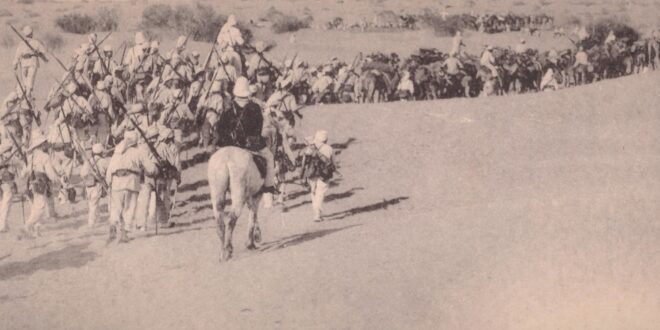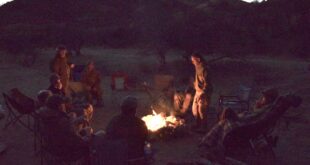The French Foreign Legion these days is more exclusive than it used to be. If there is an Interpol notice against you, for example, you won’t get through the gate. A century ago, however, a man who wanted to escape his past and assume a new identity could disappear into the ranks of “Légion Étrangère” – as long as he made the grade. Thanks to one of our readers, who sent us an account from long ago, we have a glimpse of those wilder days, as told by an Englishman whose search for adventure brought more trouble than he expected. We’ll call the recruit Soldat. Here’s a brief excerpt of what he encountered, and how in 1895 he survived deserting the “Légion Étrangère.“
Soldat’s Story
I had tried in vain to join the English Army. I was refused owing to my being rather short-sighted, but as I was determined to be a soldier at all costs I prevailed upon my friend, O’Rourke, to enlist with me in the French Foreign Legion.
READ MORE about an OSS officer and Hollywood heartthrob who served in the Foreign Legion
We enlisted at St. Malo in 1895. I utterly failed to pass the eye-sight test, but was accepted all the same. We were shipped to Oran, from where we proceeded to the depôt at Saïda. Three days at the depôt were quite sufficient to damp our military ardour, and together with an Englishman named Hides, who had formerly been a fisherman, we determined to desert.
Taking food with us, we left camp after “Last Post” had been sounded. We struck into the mountains, steering our way north by the Pole star. After rough climbing and many falls in the dark amongst the hills, we eventually found our way barred by a dense forest. We therefore halted, made up a fire, using branches as fuel, and all three went to sleep within the circle of the genial warmth; for the nights are often very cold in Algeria, in striking contrast to the burning heat of the day.
In starting on that eventful journey we had each supplied ourselves with a thick cudgel to aid us in our tramp. Our idea was to travel only by night, as we feared being seen by the Arabs, who usually put French deserters to death with horrible tortures.
We aimed to reach the sea-coast of Oran, capture a fisherman’s boat, and then sail out into the Mediterranean on the off-chance of being picked up by a passing steamer. It was a desperate scheme, but the only one we could devise.
We were awakened by the cold, the fire having gone out. Our teeth chattered uncomfortably, and we thereupon decided to walk on till daybreak, when, after surveying our position, we took another nap. We remained in this second encampment until dusk had again fallen, and then resumed our march, always following the direction of the North star.
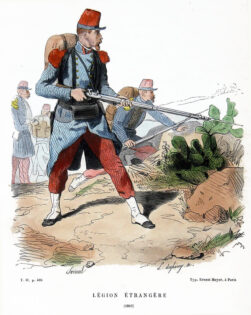
Before daybreak our passage was barred by a river, so we called a halt, lighted a fire, and once more sought oblivion in slumber.
I awoke before my comrades and tried to rouse them, but only received grunts in reply. A little rough treatment, however, speedily woke them, whereupon I seriously warned them of the dangers we incurred by loitering in so exposed a spot.
Hardly had I uttered the words when, on looking up the river, we were startled to see two Arabs approaching us rapidly. They came on yelling wildly, and were soon joined by others. I promptly sprang into the river and dashed towards the other side, followed by my companions.
Despite our obvious danger I could not help laughing, because all the other two seemed to care about was the fear of wetting our small stock of bread, which O’Rourke carried in a haversack.
Finally we succeeded in clambering up the slippery bank; but, being completely worn out with fatigue, could go no farther, our wet clothes being an additional impediment.
I suggested that as we were likely to be caught and murdered, and were, furthermore, very hungry, we had better eat our bread. This we accordingly did as fast as we could.
During this time the Arabs remained on their side of the river, being evidently under the impression that we had some trap laid for them; for when I pulled out my sodden handkerchief and waved it as a flag of truce they evidently thought it was a revolver, as they scattered right and left.
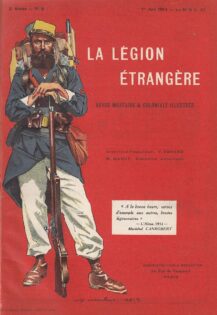
Eventually we managed to make friendly signs. They plucked up their courage, and came across the river in single file.
They seized us, and took us to their encampment. The women and children turned out to see us. We were made to sit down. A guard was put behind each of us, while the remainder of their group squatted down in a ring around us, evidently to deliberate upon our fate.
The prospects of coming to an untimely end did not make me forget the pangs of hunger – only whetted by the saturated bread – and I quickly made them understand that we were both hungry and thirsty. After a time they gave us some buckwheat cakes and sour goat’s milk, which was decidedly welcome but very unpalatable.
The palaver being ended, we were told to get up. A few of the Arabs, armed with pistols and knives, escorted us about two miles from the encampment.
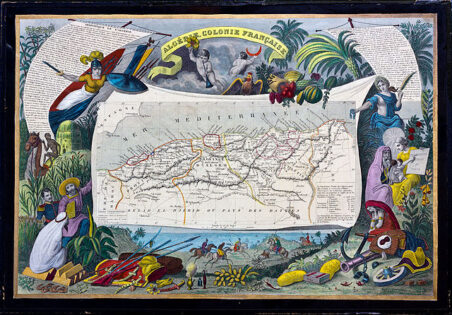
Now, thought I, we are going to be dispatched. But the Arabs disagreed among themselves, and appeared to me to be hesitating between shooting us there and then or taking us to Mascara, the nearest military station, where they would have received twenty-five francs for each of us from the military authorities. A bounty was on our heads. Would they kill us, or sell us?
Eventually one came up to me and, pointing towards the north, told me to go.
I could scarcely believe my ears, but quickly stepped out a couple of yards, although expecting to be shot down instantly.
My comrades speedily followed my example. And, as the Arabs did not threaten us, we moved away another few yards, but with fear and trembling. Nothing serious happened, however, and we finally set off at a good pace, shouting our thanks to these very exceptional locals.
Whether they understood our expressions of gratitude is doubtful, but that they were, as I say, exceptional, is undisputed; for we were afterwards informed that it is very rarely indeed that soldiers meet with any mercy at the hands of the Arabs.
 Soldier of Fortune Magazine The Journal of Professional Adventurers
Soldier of Fortune Magazine The Journal of Professional Adventurers


